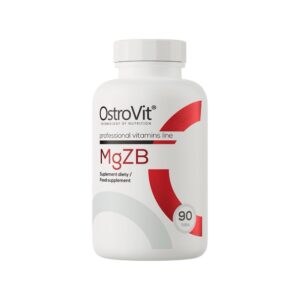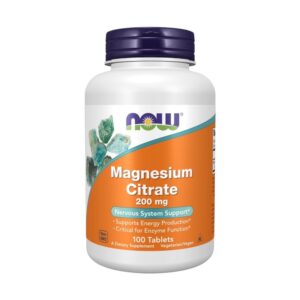Magnesium
What is magnesium?
Magnesium is a nutrient that the body needs to stay healthy. Magnesium is important for many processes in the body. For example, it regulates muscle and nervous system function, blood sugar levels, and blood pressure. It also helps build protein, bone mass, and DNA (the genetic material present in cells).
When to take magnesium?
Supplements are a suitable option when you suffer from a lack of magnesium in the body. Above all, they are beneficial for people with poorly balanced diets or, for example, for athletes with a high training load.
If your diet does not provide you with enough magnesium and if you cannot modify it or if you do the intense physical exercise, you can take a magnesium supplement to compensate for any magnesium losses.
How much magnesium per day?
The recommended daily amount of magnesium varies by age and gender:
- Babies up to 6 months of age 30 mg
- Babies 7 to 12 months of age 75 mg
- Children 1 to 3 years of age 80 mg
- Children 4 to 8 years of age 130 mg
- Children 9 to 13 years of age 240 mg
- Adolescents (males) 14 to 18 years of age 410 mg
- Adolescents (girls) 14 to 18 years of age 360 mg
- Men 400–420 mg
- Women 310-320 mg
- Pregnant teens 400 mg
- Pregnant women 350–360 mg
- Lactating adolescents 360 mg
- Lactating women 310–320 mg
Magnesium benefits
1. Magnesium is involved in hundreds of biochemical reactions in your body
Magnesium is a mineral found in the land, sea, plants, animals, and humans. About 60% of magnesium in the body is found in bones, while the rest is found in muscles, soft tissues and fluids, including blood.
2. Magnesium may increase exercise performance
Magnesium also plays a role in exercise performance. During exercise, we may need 10-20% more magnesium than when we are resting, depending on the activity.
3. Magnesium fights depression
Magnesium plays a critical role in brain function and mood, and low levels are linked to an increased risk of depression.
4. Magnesium is effective against type 2 diabetes
Magnesium also has beneficial effects against type 2 diabetes. About 48% of diabetics are believed to have low levels of magnesium in their blood. This can affect the insulin’s ability to keep blood sugar levels under control.
5. Magnesium can lower blood pressure
Studies show that magnesium supplementation can lower blood pressure. In one study, people who took 450 mg per day experienced a significant decrease in systolic and diastolic blood pressure.
6. Magnesium has anti-inflammatory effects
Low magnesium intake is linked to chronic inflammation, which is one of the driving factors for ageing, obesity, and chronic disease.
7. Magnesium can help prevent migraines
Migraines are painful and debilitating. Nausea, vomiting, and sensitivity to light and noise
occur often. Some researchers believe that people with migraines are more likely than others to be magnesium-deficient.
Magnesium side effects
In general, the most common side effects of an excess of magnesium is usually diarrhoea, since normally, excess magnesium is usually eliminated through the rectum, and also through the urine. Other side effects of the effect of magnesium can be vomiting, constant nausea, or heavy sweating. In any case, it is not something very common, and in addition, in many cases, it is usually undetectable.
On the other hand, magnesium has contraindications, and should not be administered either in supplements or through a diet rich in magnesium in such cases as follows:
People who have kidney failure should not take magnesium supplements, as their kidneys will not filter magnesium adequately, to expel it in the urine. Since magnesium is difficult to assimilate and expel, people with kidney failure should not take it in supplements, or have daily diets rich in magnesium.
Magnesium is good for children, but in very controlled and recommended doses: less than 65mg in children between 1 and 3 years old, and 110mg daily between 4 and 8 years old. Hence, it is necessary to control the diet of the smallest people in the house. On the contrary, the absorption and intake of foods rich in magnesium is very suitable for people who can have magnesium deficiency, as is the case of athletes, who eliminate
magnesium more easily with perspiration, or diabetics, who may be at risk of suffering from a magnesium deficiency and increasing their doses can significantly improve their pathology and excess insulin
On the other hand, vegans will not have many problems with magnesium deficiencies, due to their diet rich in vegetables, fruits and nuts. Nevertheless, their daily intake of magnesium must also be watched since this mineral cannot be easily eliminated and its excess can produce dizziness, diarrhoea and vomiting.
Best magnesium supplements
If you want to buy the best magnesium supplements you’re in the right place, at FitCookie we have the best magnesium supplements that’ll help you to reach your goals. Some of the best products are:
- Deep Sleep 75Caps – Lab One
- Liquid Calcium & Magnesium 30 Softgels – Swanson
- Raw Organic Moringa Leaf Powder Superfoods 240g – MRM Nutrition
With us, you’ll find the best quality and prices.
Trust us as many people have!















